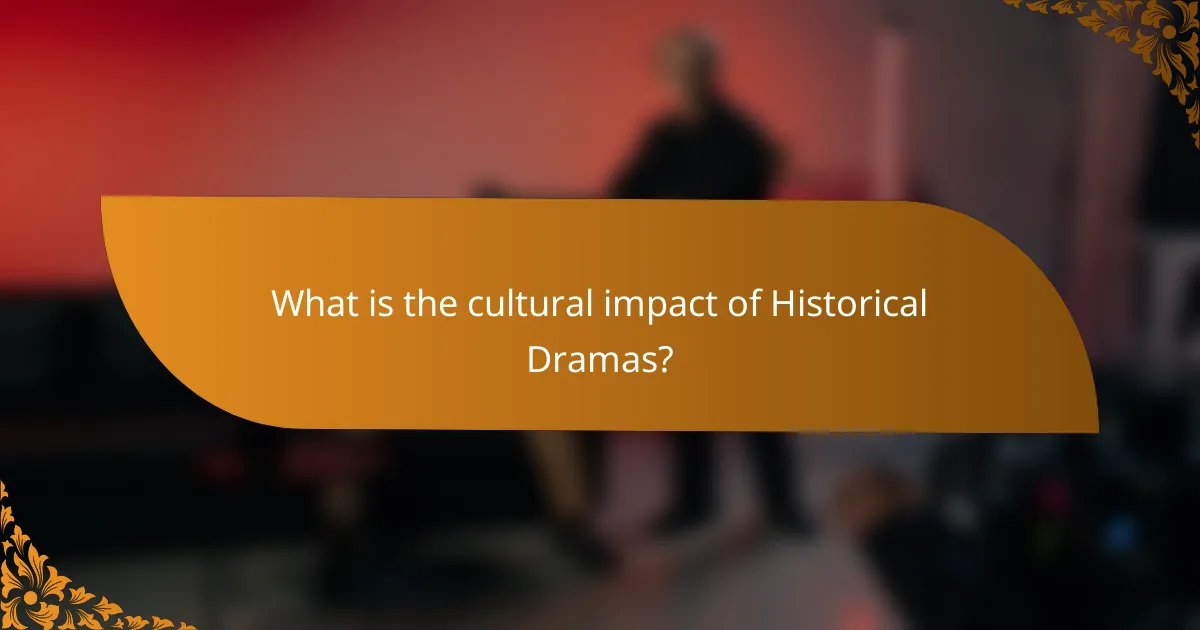
What are Historical Dramas and Their Significance?
Historical dramas are a genre of film or television that portray historical events and figures. They aim to recreate specific periods, often blending fact with fiction. These dramas provide insight into cultural, social, and political contexts of the time. They can educate audiences about significant historical moments and figures. For instance, shows like “The Crown” depict the complexities of leadership and personal sacrifice in the British monarchy. Historical dramas also spark interest in history, inspiring viewers to explore further. Their significance lies in their ability to shape public perception of history. By dramatizing real events, they can influence societal understanding and appreciation of the past.
How do Historical Dramas differ from other genres?
Historical dramas differ from other genres primarily through their focus on real historical events and figures. They often prioritize accuracy in depicting historical contexts. This attention to detail sets them apart from fictional genres. Character development in historical dramas frequently reflects the complexities of real-life individuals. These narratives aim to educate audiences about specific time periods. They may incorporate historical events that shaped societies, unlike purely fictional stories. Additionally, historical dramas often evoke cultural and social themes relevant to the time depicted. This blend of fact and narrative is less common in genres like fantasy or science fiction.
What characteristics define a Historical Drama?
A historical drama is characterized by its depiction of historical events and figures. It often emphasizes accuracy in representing the time period. These dramas typically incorporate real historical contexts and settings. Character development is crucial, showcasing the motivations and experiences of historical figures. The narrative often intertwines personal stories with significant historical events. Historical dramas may also highlight cultural elements of the era, such as language, costumes, and social norms. They aim to evoke emotional responses while educating viewers about the past. Notable examples include “Lincoln” and “The King’s Speech,” which blend fact with engaging storytelling.
Why are Historical Dramas popular among audiences?
Historical dramas are popular among audiences due to their engaging storytelling and educational value. They transport viewers to different time periods, creating immersive experiences. These dramas often feature rich character development, allowing audiences to connect emotionally with historical figures. The combination of real events and fictional narratives makes them compelling. Additionally, historical dramas often highlight cultural heritage, fostering a sense of identity and pride. Their popularity is further evidenced by high viewership ratings and critical acclaim across various platforms. For instance, shows like “The Crown” and “Chernobyl” have garnered significant attention and awards, reflecting their impact on viewers.
What role does accuracy play in Historical Dramas?
Accuracy is crucial in historical dramas as it shapes the audience’s understanding of past events. These productions aim to depict real historical figures and events authentically. When accuracy is prioritized, it enhances the educational value of the drama. For instance, the portrayal of events like the American Civil War in series such as “The Civil War” by Ken Burns provides viewers with factual insights. Conversely, inaccuracies can lead to misconceptions about history. An example is the dramatization of events in “The Tudors,” which often strays from historical facts. Such deviations can distort the public’s perception of historical figures. Accurate representation fosters a deeper connection to the past, encouraging viewers to engage with history critically. Overall, accuracy in historical dramas is essential for both storytelling and education.
How is historical accuracy measured in these productions?
Historical accuracy in productions is measured through various criteria. These include fidelity to documented events, consistency with established timelines, and portrayal of historical figures. Experts often analyze scripts against primary sources, such as letters, diaries, and official records. Additionally, historians may evaluate the cultural and social context depicted in the narratives. Audience reception can also serve as a gauge, reflecting public perception of authenticity. Productions may undergo scrutiny by academic reviewers, further assessing their adherence to historical facts. For instance, the portrayal of events in series like “The Crown” has been examined for accuracy against historical timelines and documented events.
What are the consequences of inaccuracies in Historical Dramas?
Inaccuracies in historical dramas can lead to the distortion of public understanding of history. Viewers may form misconceptions about historical events and figures. This can perpetuate stereotypes and biases. Historical inaccuracies can also undermine the credibility of the genre. For instance, the portrayal of events in films like “Braveheart” misrepresents key historical facts. Such inaccuracies can influence educational perspectives on history. As a result, audiences might accept fictional narratives as factual. This can ultimately affect cultural memory and identity.
How is character development portrayed in Historical Dramas?
Character development in historical dramas is portrayed through the evolution of characters influenced by historical events. These dramas often depict characters facing moral dilemmas reflective of their time. Their growth is shown through personal challenges and societal pressures. Historical accuracy enhances the authenticity of their experiences. Characters may transform from naive individuals to seasoned leaders. Relationships with other characters often drive their development. The use of dialogue reveals their internal conflicts and motivations. Historical contexts provide a backdrop that shapes their decisions and actions.
What techniques are used to develop characters in this genre?
Character development in historical dramas utilizes several techniques. These include extensive research to ensure authenticity. Writers often base characters on real historical figures. This approach adds depth and credibility. Dialogue is crafted to reflect the era’s language and social norms. Visual elements, such as costumes and settings, enhance character portrayal. Relationships are often explored to show personal conflicts and motivations. Flashbacks can provide background and context for character actions. These techniques collectively create relatable and believable characters in historical narratives.
How do historical figures influence character arcs?
Historical figures influence character arcs by providing real-life inspiration and context. Their actions and decisions shape the narrative trajectory of characters. For example, characters may embody traits of historical figures, such as bravery or ambition. This connection adds depth and authenticity to character development. Additionally, historical events often serve as backdrops for character conflicts and resolutions. The portrayal of these figures can impact audience perception and empathy. Their legacies can drive characters toward growth or downfall. Thus, the integration of historical figures enriches storytelling in dramas.

What is the cultural impact of Historical Dramas?
Historical dramas significantly influence culture by shaping public perception of historical events. They provide a narrative framework that can enhance understanding of complex histories. These dramas often evoke emotional responses, fostering a connection to the past. For example, shows like “The Crown” have sparked discussions about British monarchy and its implications. Such productions can also inspire interest in historical research and education. Furthermore, they can challenge or reinforce national identities and cultural narratives. The portrayal of diverse characters can promote inclusivity and awareness of underrepresented histories. Overall, historical dramas serve as a powerful medium for cultural reflection and dialogue.
How do Historical Dramas shape public perception of history?
Historical dramas shape public perception of history by dramatizing events and characters from the past. These portrayals often emphasize specific narratives and perspectives, influencing audience understanding. For example, shows like “The Crown” highlight royal dynamics, shaping views on monarchy. They can also simplify complex historical events, making them more relatable. This simplification can lead to misconceptions about historical accuracy. Research indicates that viewers often recall historical dramas as factual representations, even when dramatized. A study by the University of California found that audiences frequently cite fictional portrayals as sources of historical knowledge. Thus, historical dramas play a significant role in shaping collective memory and historical understanding.
What are examples of Historical Dramas that changed historical narratives?
“12 Years a Slave” is a historical drama that changed narratives about American slavery. The film, based on Solomon Northup’s autobiography, highlighted the brutal realities of slavery. It brought attention to the experiences of enslaved individuals, challenging sanitized historical accounts. “The King’s Speech” reshaped perceptions of King George VI’s struggle with stuttering. It emphasized his personal challenges during a critical time in British history. “Schindler’s List” transformed views on the Holocaust. It depicted the moral complexities faced by individuals during World War II. Each of these films significantly influenced public understanding of historical events. They provided deeper insights into the human experiences behind these narratives.
How do different cultures interpret Historical Dramas?
Different cultures interpret historical dramas through their unique historical contexts, values, and societal norms. For instance, Western cultures often emphasize individualism and heroism in their portrayals. This can be seen in films like “Gladiator,” which focuses on personal vengeance and honor. Conversely, Asian cultures may highlight collective values and the importance of family and tradition. An example is the Chinese film “The Last Emperor,” which reflects the impact of historical events on familial ties and societal roles.
Cultural interpretations also shape the emotional responses audiences have to these dramas. In Japan, historical dramas often evoke a sense of nostalgia and reflection on past societal structures. This is evident in the popularity of samurai films, which explore themes of loyalty and honor.
Moreover, the accuracy of historical representation influences interpretation. Cultures may accept or reject dramatizations based on their alignment with historical narratives. For example, Indian audiences may critique films that misrepresent historical figures or events, as seen with the backlash against “Padmaavat.”
Overall, cultural backgrounds significantly affect how historical dramas are perceived, valued, and critiqued across different societies.
What themes are commonly explored in Historical Dramas?
Common themes explored in historical dramas include conflict, power dynamics, and social change. Conflict often arises from political struggles or personal rivalries. Power dynamics highlight the relationships between rulers and the ruled. Social change reflects shifts in societal norms and values over time. Other themes include love and sacrifice, which are often set against historical backdrops. Additionally, identity and cultural heritage are frequently examined. These themes help to illustrate the complexities of human experience in historical contexts. Historical dramas use real events to ground these themes in authenticity.
How do these themes resonate with contemporary issues?
Themes in historical dramas resonate with contemporary issues by reflecting societal challenges and values. They often highlight struggles for justice, identity, and power dynamics. For instance, issues of inequality depicted in historical contexts mirror current social justice movements. The character development in these dramas can illustrate personal growth amid conflict, paralleling modern narratives of resilience. Additionally, the cultural impact of these themes fosters dialogue about historical events and their relevance today. This connection encourages audiences to reflect on their own societal issues and inspires change.
What messages do Historical Dramas convey about society?
Historical dramas convey messages about societal values, norms, and conflicts. They often reflect the political and social issues of their time. For example, shows like “The Crown” illustrate class struggles and the impact of monarchy on society. Historical dramas also highlight the roles of gender and race, showcasing how these factors shaped societal dynamics. By dramatizing past events, they provide insight into the human experience. This can foster empathy and understanding of historical contexts. Additionally, they often critique contemporary issues by drawing parallels with the past. For instance, “12 Years a Slave” addresses themes of slavery and human rights. Overall, historical dramas serve as a lens through which audiences can examine societal evolution.

What are some notable examples of Historical Dramas?
Notable examples of historical dramas include “The Crown,” “Chernobyl,” and “Band of Brothers.” “The Crown” chronicles the reign of Queen Elizabeth II, showcasing significant events in British history. “Chernobyl” depicts the nuclear disaster of 1986, illustrating the impact on the Soviet Union. “Band of Brothers” follows a group of American soldiers during World War II, highlighting their experiences and sacrifices. Each of these dramas has received critical acclaim for their storytelling and historical accuracy.
What are the most acclaimed Historical Dramas in recent years?
The most acclaimed historical dramas in recent years include “The Crown,” “Chernobyl,” and “The Last Kingdom.” “The Crown” portrays the reign of Queen Elizabeth II and has received numerous awards, including Golden Globes and Emmys. “Chernobyl” dramatizes the 1986 nuclear disaster and won critical acclaim for its accuracy and storytelling, earning several awards, including the Emmy for Outstanding Limited Series. “The Last Kingdom” is based on Bernard Cornwell’s novels and depicts the Viking Age in England, garnering a dedicated fan base and positive reviews for its character development and historical fidelity.
What makes these productions stand out?
Historical dramas stand out due to their meticulous attention to accuracy. They often rely on extensive research to portray events authentically. This commitment to detail enhances viewer engagement and education. Character development is another distinguishing feature. Well-crafted characters undergo significant growth, making stories relatable and compelling. Furthermore, cultural impact plays a crucial role. These productions often spark discussions about historical events and societal issues. For instance, shows like “The Crown” and “Chernobyl” have influenced public perceptions of history. Their ability to blend entertainment with education sets them apart in the entertainment landscape.
How have they contributed to the genre’s evolution?
Historical dramas have significantly contributed to the genre’s evolution by enhancing narrative depth and cultural representation. They integrate factual events with character-driven storytelling. This blend allows for a more engaging exploration of history. Historical dramas often reflect contemporary societal issues through the lens of the past. For instance, productions like “The Crown” showcase political dynamics while addressing modern themes of power and identity. Additionally, these dramas have influenced public interest in history, leading to increased viewership and academic discussions. The genre’s evolution is marked by a shift towards authenticity, with creators prioritizing research and expert consultation. This commitment to accuracy enriches the viewing experience and fosters a deeper understanding of historical contexts.
What can viewers learn from watching Historical Dramas?
Viewers can learn about historical events and cultural contexts from watching historical dramas. These productions often depict significant moments and figures in history. They provide insights into societal norms and values of different eras. For instance, dramas set in the Victorian era illustrate class structures and gender roles. Viewers also gain an understanding of historical conflicts and resolutions. Many historical dramas are based on real events, enhancing their educational value. They can spark interest in further research about the depicted periods. Additionally, character development in these dramas reflects human behavior and societal challenges. This can lead to discussions about morality and ethics in historical contexts.
How can Historical Dramas inspire interest in history?
Historical dramas can inspire interest in history by making past events relatable and engaging. They often portray real historical figures and significant events in a narrative format. This storytelling approach captures the audience’s imagination and evokes emotional connections. For instance, shows like “The Crown” highlight the complexities of royal life, prompting viewers to explore the actual history behind the characters. Additionally, historical dramas often incorporate accurate details and settings, which can spark curiosity about the time period depicted. Research indicates that visual storytelling significantly enhances retention of historical facts. By blending entertainment with education, historical dramas serve as a gateway for viewers to delve deeper into history.
What practical tips can enhance the viewing experience of Historical Dramas?
To enhance the viewing experience of historical dramas, viewers can follow several practical tips. First, research the historical context before watching. Understanding the time period adds depth to the viewing experience. Second, pay attention to the details in costumes and settings. Accurate representations can enrich the authenticity of the narrative. Third, engage with supplemental materials like documentaries or books. These resources often provide additional insights into the historical events portrayed. Fourth, discuss the drama with others. Conversations can reveal different perspectives and interpretations. Fifth, take notes on key themes and characters. This practice helps in retaining important information and enhances critical thinking. Lastly, watch with an open mind. Recognizing the blend of fact and creative storytelling can lead to a more enjoyable experience.
Historical dramas are a genre that portrays historical events and figures, aiming to recreate specific periods while blending fact with fiction. This article explores the significance of historical dramas, their unique characteristics, and the role of accuracy in shaping public perception of history. It examines how character development reflects real-life complexities and the cultural impact these productions have on society. Additionally, the article highlights notable examples and themes commonly explored in historical dramas, illustrating their ability to inspire interest in history and encourage critical engagement with the past.


